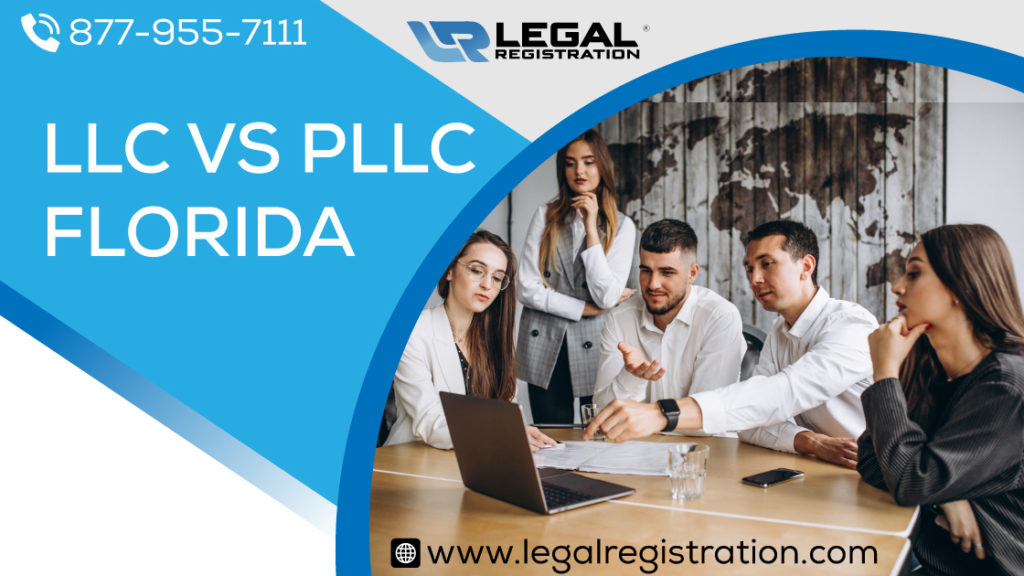LLC Vs. PLLC in Florida: An Easy Guide For Everyone

LLC vs PLLC Florida
Making A Choice Between Florida PLLC Vs. LLC
In simplest terms, the choice of a business entity in Florida, such as an LLC, PLLC, or even a corporation, will have a strong impact on the future. It speaks a lot about your business and what the tax structure will be. Plus, the kind of liability protections you will be obliged to as an owner.
Deciding between a Florida PLLC and an LLC, however, is a tough decision for many businesses. But this guide will help you make the right choice and see how you can meet your professional goals. How Long Does It Take To Get an LLC?
The Basics of Florida LLC
Florida is known for housing LLC as the most popular business entity there. Business owners usually form LLCs, so they can benefit from liability protection, flexibility, and the right to choose between corporate taxation and pass-through taxation. LLC
Every Florida LLC is easily customizable and gets up and running too. An LLC will combine liability protection with a corporation that has a pass-through taxation system available.
The Basics of Florida PLLC
In contrast, this is where a business entity is only available for professional service providers. While this LLC has the same benefits mentioned above, it doesn’t necessarily provide impressive liability coverage. You will have to gather the necessary licenses for the state and prove your profession.
Furthermore, only licensed professionals will be issued a PLLC. They will conduct business in their respective fields. PLLC, meaning medical, will be made easy for a person who already belongs to this field. LabyrinthTM Fundraising Compliance
What Do Both Have in Common?
LLC Vs. PLLC Florida will make It hard for you to find something they have in common. In reality, Florida PLLCs and LLCs have more in common than not. Every owner of either business structure is known as a “member.” Secondly, both business types are only formed when the members have acquired the articles of organization with the state department of Florida. partnership
And both entities can be customized according to the needs of the members. LLC Vs PLLC in Florida is easy to understand. Professional association vs. LLC in Florida will help you reach a massive audience easily. Hit & Run
Who is Allowed to Form a PLLC in Florida?
As explained earlier, PLLC in Florida will only be filed by professional service providers working within the state. This means doctors and other types of physicians are eligible for forming a PLLC.
According to the state of Florida, any professional service provider is of an occupation that requires a license. Below is a comprehensive list of the professionals who can work in this industry:
- Attorneys
- Dentists
- Doctors
- Veterinarians
- Architects
- Certified Public Accountants
- Chiropractic Physicians
- Life Insurance Agents

Are You Confused If You Need Florida LLC Vs Florida PLLC?
If you’re still unsure if your business is acknowledged as a professional service provider or not, you can hire an attorney. LLC Vs PLLC in Florida is a discussion that will leave you dumbfounded after going through several articles online.
Also, there are discussions and considerations, including professional associations vs LLC in Florida, you need to contemplate. Not to forget, both business entities have their own pros and cons. Because of an attorney’s experience in business formation, they’ll recommend the best option to consider. The Best State for LLC.
How to form an LLC
Every state has its own laws and rules, and the same is true when forming an LLC. An LLC is a relatively new concept and is used as an alternative to a corporation or a partnership. LabyrinthTM Fundraising Compliance
Being a business owner is a great feeling. However, it can also be a lot of hard work. When you first start off, you may not have the time, resources, or expertise to deal with managing a corporation. Fortunately, there is a solution for all of these: Limited Liability Company (LLC).
LLC is the most common form of business entity. LLC is a newer form of business entity that was created in the last 25 years. There are two types of companies in Florida: 1) LLCs and 2) Corporations. Florida is known to be one of the only states that have two different types of companies.
LLC (Limited Liability Company) is a hybrid business structure that is very popular in Florida for several reasons. LLC is treated as a partnership, but it is taxed as a corporation. It means that you will not be personally liable for the debts of the business.
An LLC is the most common business structure for a small business. It’s relatively easy to form and maintain and can be done at a low cost. To form your own LLC, you’ll need to file articles of organization with your state’s LLC filing office.
A registered agent must sign the articles, and the filing fee is usually around $100. When you form your LLC, you’ll need to decide whether you want to be treated as a corporation or partnership for tax purposes. This is important because you’ll have to follow the rules of whichever you choose. You’ll have to pay corporate taxes if you decide to be taxed as a corporation.
However, you can avoid double taxation by taking advantage of the LLC’s flow-through tax status. This means the LLC will not pay taxes on the profits; instead, those profits will be distributed to the owners, who will pay the taxes on the individual level.
An LLC is a great option for startups, small businesses and entrepreneurs because of the tax savings after the LLC effective date. What services do we provide?
How to form a PLLC
Forming a PLLC in Florida is a straightforward process. Anyone who wants to form a PLLC in Florida is required to file a Certificate of Formation with the Division of Corporations. The form must be filed with the division through the Florida Express File, which is the division’s electronic filing system.
The Certificate of Formation is a short form that simply lists the LLC’s name, its registered agent and the address of its principal office. The form can be filed online or through the mail.
What is a PLLC? The Professional Limited Liability Company (PLLC) is a business entity that combines the best features of a professional corporation and a limited liability company (LLC). It is a hybrid business structure, which is a combination of a partnership and a corporation.
The PLLC is a relatively new business structure that was created in the state of Florida in 1998. The PLLC is authorized to be formed only in the state of Florida. The PLLC is a business structure that provides the liability protection of a corporation and the tax advantages of an LLC.
A limited liability company (LLC) is a type of legal structure used by businesses, entrepreneurs and investors to limit their liability. In an LLC, the owners are not personally liable for the debts and actions of the company. In addition to this, an LLC is considered a pass-through entity for tax purposes.
This means that the LLC does not pay taxes on its income, but instead, the income “passes through” the company to the owners, who report the income on their personal tax returns. By forming a PLLC, meaning medical or law firm in Florida, the business is able to take advantage of the limited liability protection that an LLC provides while still being taxed as a sole proprietorship. Do I Need a Lawyer To Start an LLC?
How are LLCs and PLLCs Taxed?
In most cases, LLCs and PLLCs are taxed at the same rate as traditional corporations. The IRS taxes LLCs and PLLCs as pass-through entities, meaning the business owner is taxed on the business’s profits and losses.
The profits and losses of a PLLC flow directly to the members’ personal tax returns. LLCs, on the other hand, are taxed as sole proprietorships by default. LLC members are taxed on their share of the business income and losses on their personal returns.
However, when debating how PLLC vs LLC in Florida are taxed, LLCs can elect to be taxed as corporations instead. As corporations, LLCs are taxed on profits and losses at the corporate level. The profits and losses of PLLCs, on the other hand, are taxed at the owner level. The LLC or PLLC’s profits or losses are reported on the personal income tax returns of the LLC’s members.
The IRS taxes both LLCs and PLLCs as partnerships, but they’re taxed differently. An LLC that has only one member and no profits is taxed as a sole proprietorship. The IRS taxes a partnership as a partnership, whether it’s an LLC or a PLLC or PLLC vs PA.
A partnership files an informational tax return on Form 1065. The partnership reports the income, deductions and credits from the partnership. It also reports the income, deductions and credits of each partner. A partnership must pay a self-employment tax on the net earnings of the partnership. A partner in a partnership must report the partnership’s income and expenses on his or her tax return. What types of lawyers are in the Lawyer Zone network?


